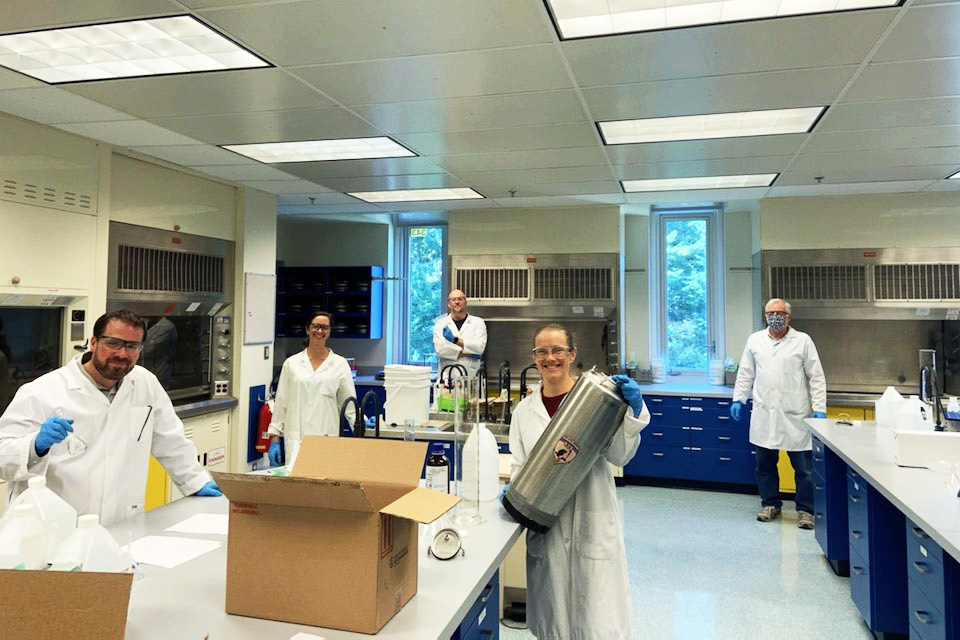UVic donates hand sanitizer

UVic donates 200 litres of hand sanitizer to Island Health
University of Victoria chemist David Leitch may be working from his home office, but that doesn’t hamper his instinct to pursue scientific discovery to help produce and donate a potential life-saver in the fight against the COVID-19 pandemic.
UVic on Tuesday delivered more than 200 litres of hand sanitizer—enough for about 65,000 single doses—for use by Island Health, whose front-line workers are in the thick of responding to the health crisis.
“The ingredients are basic. It’s pharmaceutical grade 190 to 200 proof ethanol—much stronger than the spirits you get at the local liquor store—hydrogen peroxide and a softening agent like glycerin to make sure your hands don’t get dried out to the point of seriously cracking,” says Leitch, who collaborated on the project with six other researchers.
“The recipe is in line with World Health Organization guidelines—so it’s easy, safe, useful and potentially life-saving for someone in this current climate.”
The UVic research community is pulling together to address the COVID-19 crisis including digital technologies, biomedical and biochemistry, genome research, proteomics, nursing, law, mathematics, social sciences, exercise science and 3D printing of supplies. To date, there are dozens of UVic research projects linked to the COVID-19 response.
Soap and water continue to be the best bet for hand hygiene. If that is not possible, using a hand sanitizer that is at least 60 per cent alcohol—or 120 proof—helps avoid people getting sick or spreading germs, according to the Centers for Disease Control and Prevention.
Leitch, who led the UVic effort, was able to leverage his prior experience in the pharmaceutical industry to plan and execute a manufacturing campaign consistent with stringent Health Canada standards. He recalls discussing with his colleagues the opportunity with simple questions: “It’s not like we can just whip up a solution and hand it over to a health authority. What is the regulatory process around this, and can we pull this off in time to make a difference?”
Researchers used supplies already on hand. From conception, licensing approval to manufacture, the process took less than two weeks, much faster than normal, says Leitch. He adds delivery would not have been possible without extremely rapid turnaround time for Health Canada approvals, a donation of kegs by a local microbrewery to mix the sanitizer and the incredibly hard work of UVic researchers.
UVic chemistry faculty and staff—Katherine Elvira, Scott McIndoe, Jeremy Wulff, David Berry, and department chair, Neil Burford—along with Heather Buckley, cross-appointed in chemistry and civil engineering, spent a recent morning mixing up the solutions.
It’s been incredible to witness how we can quickly and efficiently pull together, in these extraordinary times, to use our knowledge as scientists to help our community.
—David Leitch, UVic chemist
In uncertain and different times, researchers are also doing everything they can to use their knowledge and experience as teachers to keep the UVic community engaged with science, despite the new remote working reality, says Elvira.
“Science contributes vitally to some of the world’s toughest problems including the current COVID-19 response. We are all—researchers, students, UVic—adapting as a community,” she says. “Throughout, we need to ensure we can support our students and their research and their experiences right now.”
Burford adds he is inspired by the hard work of faculty, staff and students, and their efforts under these “very challenging conditions” to maintain consistency. “We have to be in touch with our colleagues, our students, checking in often, however we can. I am especially impressed with the resolve of the students as they adapt to the COVID conditions. We will get through this together,” says Burford.
In ongoing care for COVID-19 patients, Island Health welcomes donations of personal protective equipment and medical supplies through its website.


